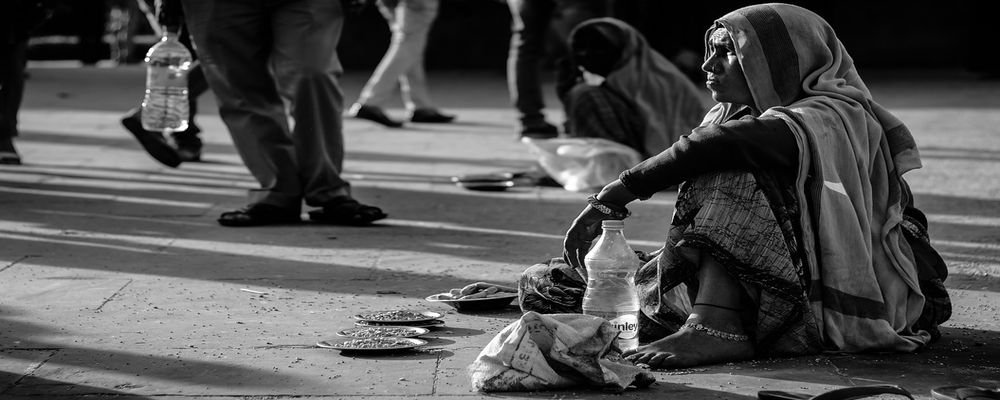The Moral Dilemma Of When To Give
To give or not to give to beggars is a moral dilemma that we all come face to face with, whether it is at home or abroad. For some reason we are more inclined to have sympathy for beggars in poverty stricken third world countries, rather than those sleeping in cardboard boxes under bridges in our own developed and thriving cities.
Is it because more often than not in underprivileged countries, there are masses of children in this situation?
Children are at the mercy not only of their own impoverished parents, but governments that have little or nothing in the way of assistance available for them. We see little crusty faces with pleading big eyes and scrawny outstretched dirty hands, which literally make you melt inside.
On the other hand there are the adult beggars that actually intimidate you with their filthiness and pushiness. Let alone the ones that quietly suffer in their intolerable misery, squatting on a sidewalk with a battered old tin in front of them for coins. In all likelihood, the adults are the ones that have survived living on the streets as a child and have had no alternative but to live out their lives in a state of human despair.
The "milk of human kindness" runs deep in most of us and to shake your head or to shoo away a beggar, actually runs contrary to how the majority of Western people are brought up. This is where the moral dilemma arises.
So the question you should be asking yourself is, "Am I helping or harming?"
Facts About Beggers
A "good" looking beggar on the "right" corner will receive more coins in their tin than the dirty old one around the corner in an alley, despite them having the same "tin" sitting in front of them. We are so superficial at times and are naturally drawn towards attractiveness rather than the ugly, no matter what we are looking at. The face of poverty wears many guises, with some more appealing than others.
Mothers with babies in their arms are a cringe worthy sight and the ultimate on the begging scene. No, the baby is not asleep of its own free will, unless it is so malnourished that the child doesn't have the strength to stay awake. Nine out of ten times the child has been drugged. Quite often the baby is not even the woman's child, but the throw away outcome of a street females' rape.
Unscrupulous adults quite often damage children on purpose to elicit sympathy. These criminal gangs are organized business syndicates, who thrive and prosper on the begging trade. They have their own defined begging areas in which they operate and are the scum of the earth. It is easy money as they also teach the children how to pickpocket as well. So when an unruly group of kids surround you in a street begging for money, there will be a sneaky little one helping him or her self to your bag or pocket.

India especially is a desperate land of organized criminal activity, where human life has no value whatsoever, apart from the income that can be generated from the abuse of it. Just like the movie "Slumdog Millionaire", the beggars are an intricate part of the criminal underworld. Begging spots are bought and paid for, and authority figures turn a blind eye as they are getting a cut of the cash. The beggar haunts are where "anything" can be arranged, as they are the "front office" of the mafia gangs that run prostitution, drugs, people trafficking, gun running or whatever other illegal activity may turn a profit. It is an industry with its own rules and laws for the unwilling participants, with a jungle mentality of eat or be eaten. The begging industry is an insidious market place that thrives on exploiting human despondency and relies solely on tourists' showing pity. Liken it to a business corporation where the more sympathy and money you can elicit, the better the corner you get to stand on. Money equals promotions in this diabolical industry trading on people's suffering.
There is also the "indirect" begging where a child or a parent will not ask for money, but ask you to go to a store with them to buy powdered milk for a child. You believe the child is dutifully taking the item home, when in fact after you have left, they return it to the store and receive a "cash" kickback for returning it. The powdered milk was never destined for any little starving mouth. This is prevalent in Laos, Cambodia and Vietnam.
Ways Around It To Help
First and foremost, to give you a sense of "giving back" to the world's poor, give to international charitable societies where they have the resources and the knowledge of how to help the disadvantaged, whereby the funds do not end up as proceeds to be lapped up by criminal gangs. The more you give to the beggar on the street, the more profitable it is for this horrendous practice to continue.
Or, help the locals who are doing jobs, rather than begging. Buy a sugar cane juice from the local vendor on the street corner in Asia, instead of frequenting a hotel lobby for high tea. Shop at the local open markets, even if you can't understand what is being said. There is always hand language and smiles to get what you want across to the local farmer behind his stall. Have fun bargaining with street vendors and keep in mind the real value that you may be debating over. It may be the difference between an evening meal and going hungry for the vendor.
If you come across "begging buskers", drop a few coins into their tin; at least they are not just sitting there doing nothing. Sometimes the music is amazing, so they are performing a service to the people who pass them by. It will warm your heart when you see the broadening smile of a blind busker when he hears the tinkle of a coin landing in his tin.
Ultimately it is sometimes very hard to turn your face away from such abject misery, but in the long run it may just be the right action to take.
Gail Palethorpe, a self proclaimed Australian gypsy, is a freelance writer, photographer and eternal traveller. Check out her website Gail Palethorpe Photography and her Shutterstock profile.















